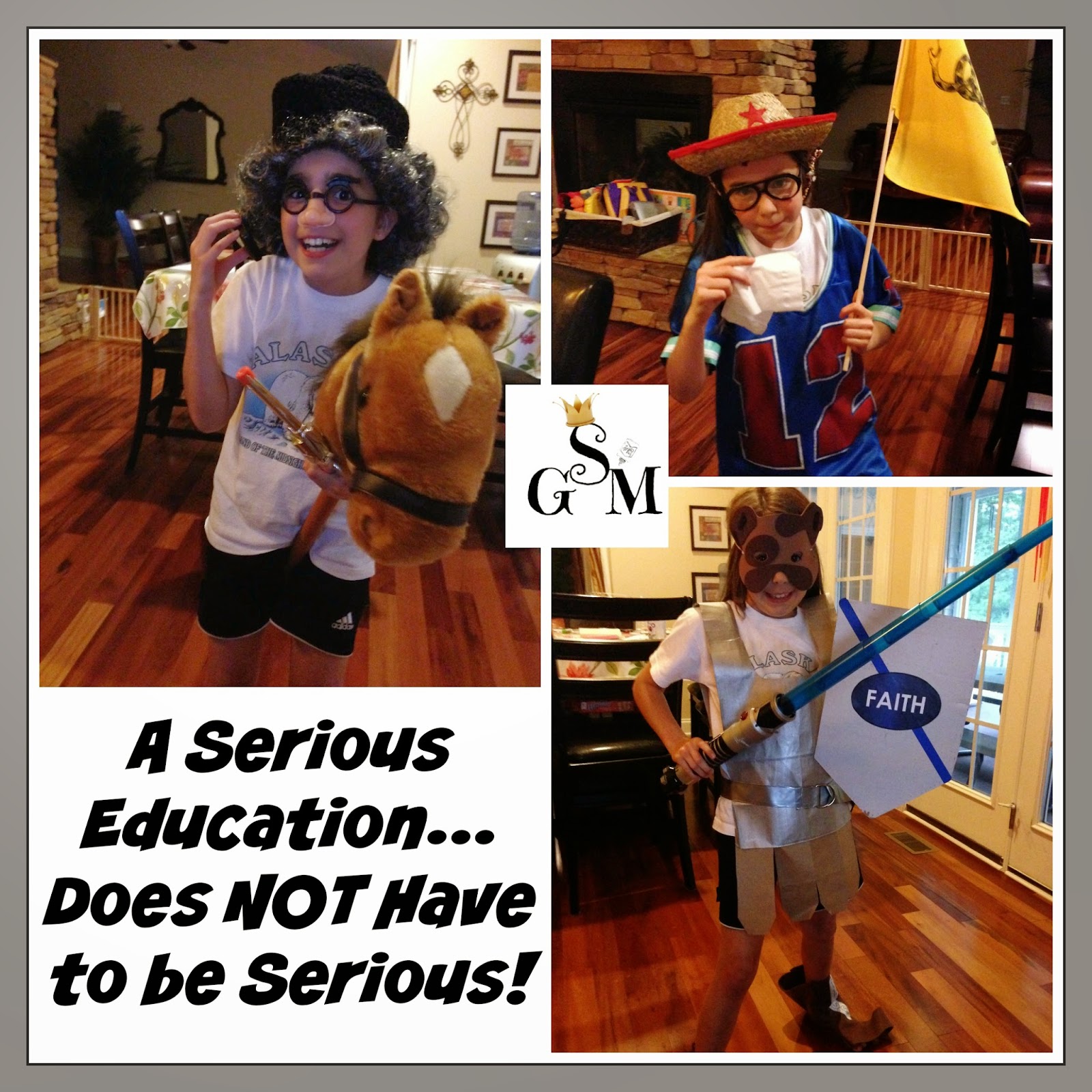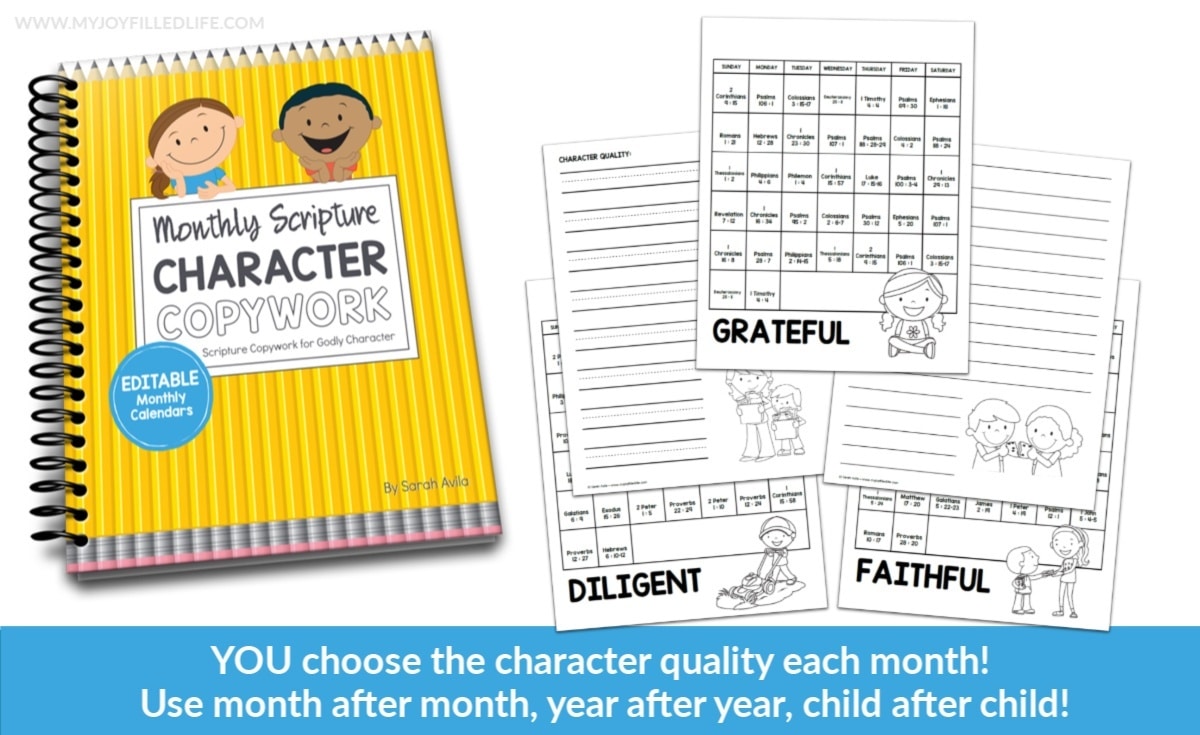Sounds crazy doesn’t it? A serious education without being serious? Isn’t a serious education sitting at a desk all day with a straight look on your child’s face as they work through all their recommended curriculum (and carefully planned out) from The Well-Trained Mind: A Guide to Classical Education at Home (Third Edition)? Or… perhaps it’s sitting all day reciting memory work and notebooking away diligently at the current weeks’ material and reviewing carefully? It takes a child with a personality type that I definitely don’t have, to hang with that all day long. If you have one of those type of children, you can count yourself truly blessed! No, at my house the less serious the better and the more movement and creativity to the day, the more likely we are to accomplish anything. So how can we pursue a serious education like classical, but not in such a serious way?
I can assure you that achieving Memory Master (if you happen to be doing CC) or doing the classics from Latin to Logic, do not have to be serious all the time! As a matter of fact, I think the less serious, the better for some learners (you know right away if you have one of those!). Here are my 10 ways to a serious education -that aren’t quite so serious!
1. Get Up and Move!
There is no written rule that you must sit in your chair to be doing school! That’s the plight of public school! Think outside the box. If you have a wiggly child, then bust a move! Memorization from learning your alphabet to math tables, can easily be done while moving! Let your child jump on a trampoline, swing in a swing, hopscotch, jump rope, or whatever they come up with. They will be much more motivated to do it, if they can pick the activity! The only rule – they must recite whatever you’ve decided or stop the activity and go to sitting until they make the connection between moving and reciting. You can check out my list of fun ways to review memory work over here.
2. Dress Up!
If you’ve looked around at Solagratiamom™ then you know we love our dress ups! It’s a very motivating thing to come out and be someone else to learn for the day. Perhaps George Washington has decided to relearn some things or a superhero has made their visit to school for the day! Let them dress up as creatively as they want to if it’s a motivating factor for getting school done!
3. Everyone Loves an Audience!
So when was the last time that teddy bear and stuffed rabbit had a good math lesson? Well, have them sit at the table and get ready to learn! Let your children bring out an audience or a pal or two, to learn with them for the day. Some days we have a full table of various stuffed animals learning right alongside of us for the day! It may add a few minutes to your day if “bear” doesn’t get his math lesson, but you’d be surprised how motivating this can be for kids!
4. Go Outside!
School is mobile when you homeschool! Take advantage of the nice days when your children just don’t want to be inside doing school. Take the books and hit the bikes or walk to a special place to call school to session! Use things in nature to illustrate lessons as you go! Pack a lunch and picnic while you’re out there. Enjoy school in a new way. Help highly distracted kids find calm in nature!
5. Make It Up!
Let your kids come up with ways to act out the ideas they are learning or memorizing that are fun for them. Thinking up hand motions, seeing “things” in visual information (like maps) and making videos of themselves reading a paper with dramatic flare, are a few ideas that can make serious subjects, not so serious!
6. Find a Fun Destination!
Come up with a cool coffee shop or a nice bakery that isn’t too busy and wouldn’t mind you setting up shop for a few hours of school that day! We have a local coffee shop that we frequent and it has a great alliteration name for Fridays! I use it as a motivator for working diligently through the week because (it has outdoor seating -even better) they make special kids “Italian soda” there. (Bring lighter subjects that your kids can handle doing with the distraction of other people around.)
7. Rover Needs an Education!
If you have a dog, then you have a terrific way for your child to practice their skills at teaching! It’s highly motivating to read to, explain a math equation to or just educate Rover on any of the things that your child may have low interest in learning, unless they’re showing someone else. We have a classically educated dog around here who has sat through many a lesson!
8. Curriculum Is Key!
Find serious curriculum that’s presented in not such a “serious” way! Using curriculum like Song School Latinor Writing & Rhetoric Book 1: Fable
are examples of creative classical curriculum! I wrote in more detail about choosing curriculum that is right for your child and your own learning styles and personalities, over at Living and Learning at Home. Finding the right fit is more important than following a specific person’s recommendations. That person making the recommendations may have totally different learners or children’s personalities then you do – so go with what you know about your child’s learning style!
9. Friends!
If your children are social and it’s motivating for them, then buddy up with another friend or a few! Pick a day or a couple, to do school together. That doesn’t mean you have to be doing the same curriculum and be at the same place. Just having someone to do it with and knowing that once it’s done, there is a built in play date for a little while, or a lunch date -can be very motivating and make school less serious and more fun! If you aren’t doing the same curriculum -just bring subjects that don’t require teaching. Bring the spelling workbook, writing for a paper, math review lesson etc.
10. Get the Principal!
Have your husband get involved! Does your husband work from home or work close by? Pick a day or two a month for Daddy to do a subject or two. Or find a picnic place for Daddy to meet you all during the school day for a lunch break. Let the kids show Daddy something special that they have worked on for him that has to do with their school work. An example would be coming up with something they can act out, build or draw for him. If you want to see acting out a science activity, then you can read it here. Have them draw a picture or design their own model of some process they are learning about in science! Let them use their imaginations!







